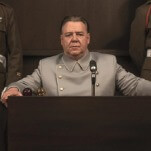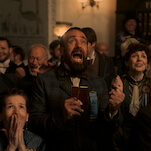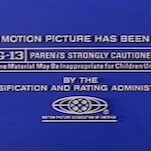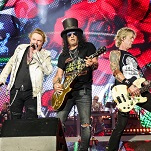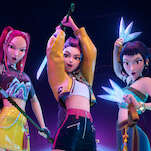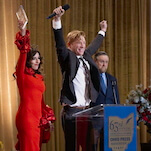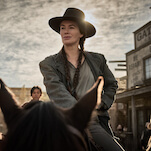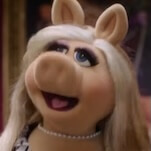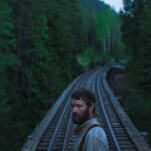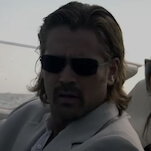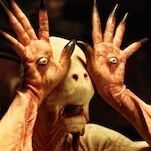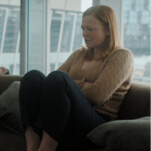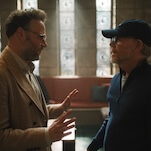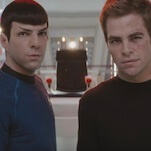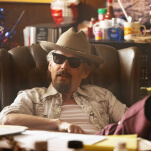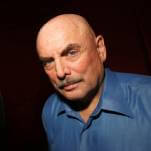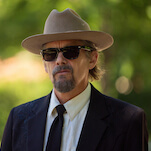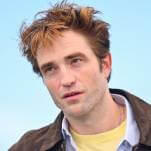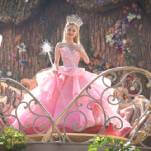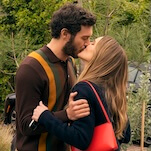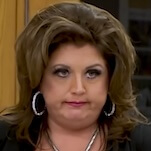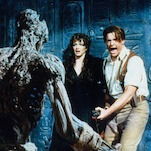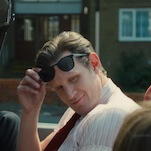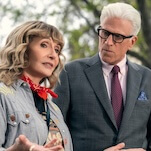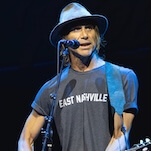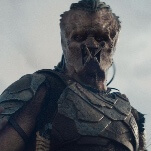Pootie Tang: A Look Back With Director Louis C.K.
A veteran stand-up performer and sketch-comedy writer-director, Louis C.K. was part of the original writing staff of Late Night With Conan O'Brien, where he created popular bits like "Actual Items" and "The Staring Contest." Stints at Late Show With David Letterman and Dana Carvey's short-lived prime-time sketch show followed, as did a slot on The Chris Rock Show's writing staff, which won an Emmy in 1999. C.K.'s other projects include Rock's film Down To Earth, which he co-wrote; the 1998 low-budget comedy Tomorrow Night, which he wrote, directed, and produced; Cedric The Entertainer Presents, which he wrote and co-produced; and his own sitcom, which is still in development. But C.K. is probably best known as the creative force behind the virtually avant-garde 2001 film Pootie Tang, one of the strangest comedies ever to have come from a major American studio. Pootie Tang would have seemed odd even from the risk-taking Hollywood of the '70s, but arriving at a time when massive budgets, fierce competition, and inflated advertising costs are pushing American studio filmmaking toward new depths of homogenization, the film was a jaw-dropping anomaly. After extensive studio interference and much re-cutting, C.K.'s oddball romp about a crime-fighting, hit-making black superstar who speaks his own incomprehensible language was released to vitriolic reviews and paltry box-office returns. The film developed a sizable cult following, however, particularly in the comedy and hip-hop communities. The Onion A.V. Club recently spoke with C.K. about Pootie Tang, writing for television, and Star Search.
The Onion: You were on Star Search.
Louis C.K.: I loved doing Star Search. It was really an old-fashioned show-business experience, and those are rare now. I had never been out here in Hollywood for anything real, so it was fun. I got to know the supermodel on my show, and see that weirdness. I shouldn't really say I got to know her, but it was weird, because she seemed like a real confident, smart girl, but she was with a big, fat, gross-looking boyfriend who was really mean to her. Then, when the other model was walking down the runway, she started to cry. I said, "What's wrong?" and she said, "Do you think she's prettier than me?" I think just the idea of that made her cry. I had a great moment. I got on Star Search with a kid's dancing group. There were these little 6- or 7-year-old girls in sequined outfits, dancing. They lost the round, but as it was explained to them on the show, "You've already won three times, which means that you go on to the Tournament Of Champions, even though you lost today. So all you've done is let these other little girls have a chance, and you don't lose anything." So everybody's cheerful. Then backstage, 20 minutes later, the den mother who is running them is sobbing in disappointment, and the girls are all standing around her confused, not understanding why she's upset. One of them softly goes, "But Mommy, it's okay, because we're already in the championship." And she goes "Just shut up!" As far as my experience, I got zero laughs. I went up there, and from "Hello" to the crowd, I was in the wrong room. It was horrible. I was even shaking a little. I've never seen it. I'd like to see it someday. That's the only television appearance I ever did that I haven't watched.
O: Where did the idea for Pootie Tang come from?
LCK: It comes from way back when I was a kid and I used to enjoy talking nonsense. But I used to try to talk nonsense believably, you know what I mean? Like I'm really communicating, and not just talking a string of gibberish. It's something I used to do all the time: "Hey, it's a tippi tai a ma tammy fae." I just used to talk like that. Then I started trying to think of a sketch for Chris Rock, and I came up with the notion of a guy who's so cool, he doesn't even speak English, but he exudes this coolness and this ease, and Chris buys into it and doesn't question it, and just chats with him. The notion to me was that someone could just be flipping around and see this, and it would take them a few beats to see that these guys aren't saying anything. So I wrote it and walked down the hall to Lance Crouther, who was a writer on the show, and I asked him to read it to me. He read it and thought it was kind of funny, so we gave it to Chris. Chris was wary of it. He thought it was funny, but no one was sure where it would land. We rehearsed it, because we rehearsed like five sketches and ended up using one each week. We rehearsed it for three or four weeks without using it for the show. None of us were really sure anyone else would get it. Then one night, they had chosen a sketch where Paul Kozlowski, a writer on the show, had so much white guilt that he had his skin removed, so he comes out in bandages and Chris interviews him. I think the night of the show, we realized that this thing was going to really bomb, so we replaced it with Pootie Tang, dusted it off, and got [Crouther] in these crazy clothes and these glasses. Everything was kind of thrown together. Two minutes into this sketch, people are chanting the guy's name. The crowd just fucking bought right into it. They loved it. Chris' crowd was great, because they were kind of an amped-up, high-energy black crowd, but they were up for anything, and they loved silly humor. When I started working there, Chris made it very clear to me and the other guys, "Don't think of this as a black show. Don't write 'Blackety Black Santa In The Ghetto' type of shit." He told me, "Take your Conan quirky stuff and do the exact same thing here, because nobody in black comedy is doing that. Black audiences are being fed the same gangsta horseshit comedy, show after show." His idea was just "Let's be funny." So audiences were grateful to be given so much credit, I think, to get smart humor. And also, they really give it up, these people, these crowds. Grandmaster Flash warms them up, and it was like the best audience in the world, so Pootie Tang just exploded on this crowd. We just went, "Okay, that was great," and put it away, because we didn't want to be become like SNL and drag shit into the ground. Chris said to me, "We can do it again if you want, but I'm not going to pressure you, because who needs it?" It took another year before we did it again. We basically did one every year. Then, one year, we did an entire E! True Hollywood Story on Pootie Tang's life. That was a huge success, and that felt like, "Hey, maybe this character has legs." Chris asked me if there was a movie in it. Because the first time Pootie was on the show, Pootie's promoting his movie Sine Your Pitty On The Runny Kine, so we always joked that someday that movie should be made. So I just went off quietly and wrote it, kind of as an experiment. It was a very different movie when I wrote it. Pootie had guns, and he was violent. Everyone was fighting all the time. It was more raw and nasty. I wrote it and gave it to Chris, and he said, "That's crazy." And we forgot about it. Then, a couple years later, I was writing a movie with Chris at Paramount, and the producers asked me if I had anything kicking around, because they liked the work I was doing. So I gave them Pootie Tang, along with some tapes, and they said, "Let's make this movie."
O: What happened from there?
LCK: Originally, it was supposed to be a Paramount Classics film, which is their small-film subsidiary. It was going to be just a little $2 million movie, and I would direct it with my usual little crew. I had made a feature already. We're skipping ahead. My second year at Chris Rock, I made a feature called Tomorrow Night, which was at Sundance, blah blah blah, nobody ever saw it. So I had one film under my belt. They gave me a shot at making Pootie Tang, but as we were developing it, Paramount became really interested in it as a possible money-maker. So they swallowed it up from Paramount Classics, upped the budget to $4 million, which is still a small movie, and made it a straight Paramount film, which subjected it to more scrutiny and hurt it. So we made the movie. I directed it. It had to be PG-13, so the script had to be heavily rewritten so they could make more money on it. When they asked for that, I considered saying, "No. Let's just make the movie I wrote." But then I thought that was an interesting challenge. And Pootie was a good-natured character. He's a guy who's a champion for kids. I always saw him that way, that he's about kids, and positive. I wanted him to be different from what he made fun of. I wanted him to be an icon who didn't trade on it. A lot of it came back to bite me on the ass. I wanted him to be the one guy who didn't exploit women with his fame, that when women threw themselves at him, he'd throw them away, because he was sort of chaste. Also, he taught the guys around him to respect women. Later, people ended up asking me, "What is this guy, a faggot?" So all that shit gets complicated.
O: What was the original plot of Pootie Tang?
LCK: It wasn't far from what's there as far as the storyline, but there were a lot of different details. This is why I didn't mind rewriting it, because when that went away, how else is Pootie going to beat a guy without a gun? Well, he dodges bullets with his belt. It was fun, actually, to find ways around him being proactively violent. The idea that he uses the belt and whips people like a scolding father and does karate was more appealing. I realized that what I had written before didn't work, and I didn't like it anymore when I started writing away from it. I'm glad I didn't make it, honestly. In writing the script, I felt that was an improvement, but later, when I was done shooting it, Paramount and I kind of collided and tried to make two different movies. Guess who won that battle?
